 I love my Link 10. I love my Link 10.
With the conversion of our refrigerator to electrical from engine-driven, we have increased our use of, interest in, and awareness of electricity. We have not generally been big electricity consumers as we generally fall asleep shortly after dark and are quite content to sit in gloaming pre-dawn to witness the awesome tropical sunrises without the distraction. Our idea of a big energy splurge has been to watch an issue of the Sopranos on the computer - and even then we generally time it to coincide with our evening running of the engine to recharge the batteries. But the Link 10 takes all the guilt and worry out of the whole process and puts battery management on a scientific basis. It tells you how many amp hours you have taken out of the batteries, how many amps you are drawing (or putting in) and how many hours you have left at the current rate of consumption. For the number phobic: 4 green bars is good, flashing green is "totally topped up" and three green bars is 75% depleted, etc. Batteries don't like to be fully depleted as they will tolerate fewer topped up to depleted cycles than they will 50% to 85% cycles. The last 15% of capacity is hard won as the batteries' ability to take up the power decreases as it approaches full and going much below 50% of capacity really shortens the batteries' life. Until now, we have used power the way a dieter uses the refrigerator. Furtively and with some guilt and a vague hope that it will all work out.
All that is changed now. I have a Link 10. It's really cool. I now know that the little solenoid that allows the gas to flow to the stove draws over an amp. This just enables the stove. It draws an amp if you are cooking or not. Quel horror! Remember to turn that little sucker off when the coffee water has boiled!
So this little meter with the simple number takes the whole element of guilt and worry out of the equation:
"What are we drawing now?"
"2 amps."
"What's on?!!??!!."
"How many amp hours are we down?"
"52."
"OK, we should run the engine for a 40 minutes."
Your intrepid travelers really have conversations like these. And we take great pleasure in them! Just another pair of nerds in a sail boat. Actually, we'd love a similar meter for the fuel, like on a Prius. If you stomp on the pedal, you've only got a range of 100 miles; you're using gas at 15 MPG! Why, you are enriching 3.2 Sheiks a month! We could use one for water. Hey, keep on singing in that shower for another 10 minutes and you're gonna be in the scrum of French boats jockeying for position at the dock for water. Yeah, mon! Its a med-moor* too!
click for next column>>
|  We need one for food consumption: eat that pizza and you're gonna need to go for a very long swim. Think about it. This could be really cool. A little gauge on your wrist that told you how many bites of ice cream you can eat before your waist expands. Alternatively, it would tell you how many laps to run to cover your calorie surplus. We need a Link 10 for garbage. "At this rate of garbage production, you won't need to go ashore with one of those stinky plastic bags for another 1.2 weeks". How about one for CO2 emissions? National Energy consumption? ("At this rate of consumption, you will need to police 1.47 third world countries this year"). What the world needs now is.... Perhaps I am getting carried away. We need one for food consumption: eat that pizza and you're gonna need to go for a very long swim. Think about it. This could be really cool. A little gauge on your wrist that told you how many bites of ice cream you can eat before your waist expands. Alternatively, it would tell you how many laps to run to cover your calorie surplus. We need a Link 10 for garbage. "At this rate of garbage production, you won't need to go ashore with one of those stinky plastic bags for another 1.2 weeks". How about one for CO2 emissions? National Energy consumption? ("At this rate of consumption, you will need to police 1.47 third world countries this year"). What the world needs now is.... Perhaps I am getting carried away.
At the other extreme, we have been trying to repair our fuel gauge. It has been stubbornly stuck on full and, after four hours of tracing the wire through the cramped and convoluted passages of our production boat, we determined that the ground wire is just faulty. (Hecka'va job, Brownie.) Unlike our glorious leader, we did get a little suspicious when after a month of running the engine for an hour a day, it still registered full. We have now got it to read 1/2 full (regardless of the actual level of fuel) and are fully confident that should we manage to replace the entire administration (uh, I mean wire), we might at least get accurate fuel readings. We have yet to implement solar power or wind power which would actually accomplish something - but our yardstick is ready and we are prepared to stay the course. By the way, did you know that "cut and run" is also a nautical term? If a boat is set upon by pirates while at anchor (where it cannot manoeuver to fire its guns), the captain would "cut" the anchor line (saving the time it would take to laboriously raise the anchor) "and run" (sail downwind, the fastest point of sail). Once moving, the ship could fire or flee as appropriate. This was generally considered smarter than sitting and getting shot at until sunk.
Lance & Susie
S/V Eaux Vives
Le Marin, Martinique, FWI
*A med-moor is short for a Mediterranean Mooring, a process by which Europeans back their boats up to a quay like piglets trying to get to teats but backwards, stern first, in the least maneuverable direction for driving a boat.
Lance
|